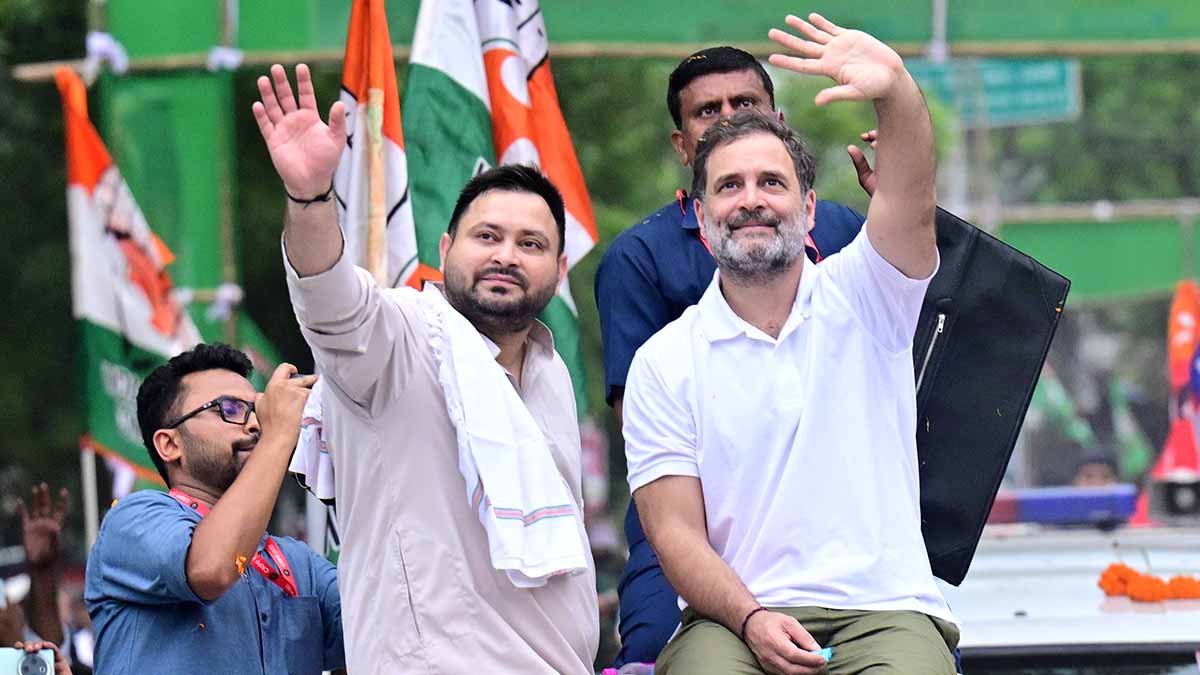Bihar elections: Grand Alliance in tatters as polling nears; Congress, RJD pin hope on last-minute talks
 Moving ahead: Rahul Gandhi and Tejashwi Yadav at the ‘Voter Adhikar Yatra’ | Rahul R. Pattom
Moving ahead: Rahul Gandhi and Tejashwi Yadav at the ‘Voter Adhikar Yatra’ | Rahul R. Pattom
With barely two weeks to go for the first phase of polling in Bihar, the opposition Grand Alliance is racing against time to resolve internal dissensions, as the allies remain locked in “friendly fights” across multiple constituencies. In 243 seats, the Grand Alliance has fielded 254 candidates, threatening to derail the initial momentum it had gained during the yatras jointly conducted against the Special Intensive Revision (SIR).
The Congress has tasked its senior leader and former Rajasthan chief minister Ashok Gehlot to hold negotiations with the RJD leadership to iron out differences. The internal rift has given the ruling NDA bloc an opportunity to target its opponents in the crucial polls. If all goes well, the Grand Alliance will jointly hold a press conference on October 23 as a show of unity.
The NDA has got an initial lead even before voting began, as three candidates of the Jan Suraaj Party announced their withdrawal in favour of the BJP. In Sugauli, the Grand Alliance candidate’s nomination was cancelled on technical grounds, giving a literal walkover to the NDA’s candidate from the Lok Janshakti Party (Ram Vilas).
Another example of chaos within the Grand Alliance is the Gaura Bauram seat, where the RJD allotted the ticket to its candidate Afzal Ali Khan, who went ahead and filed his nomination. Later, after last-minute negotiations, the constituency was reassigned to the Vikassheel Insaan Party (VIP), an RJD ally. But Khan refused to withdraw his candidature.
Will RJD leader Tejashwi Yadav campaign against his own party’s symbol? A rare spectacle, but one perhaps necessary to ensure an alliance victory in its stronghold.
The friendly fights continue across several constituencies, including Vaishali, Sikandra, Narkatiyaganj, Kahalgaon and Sultanganj, where both the RJD and the Congress have fielded candidates. Meanwhile, in Bachhwara, Kargahar, Biharsharif, and Rajapakar, the Congress and CPI nominees are contesting against each other.
To add to the alliance's woes, smaller parties like the Jharkhand Mukti Morcha (JMM) have expressed their anger over being ignored. The JMM has withdrawn from the fray, accusing the RJD of overlooking its demands.
The last-minute negotiations between the Congress and the RJD will be crucial, as the final date for withdrawal of nominations is October 23 for the second phase, while it has already passed for the first phase. So, even if matters are resolved by the withdrawal of competing candidates, “friendly contests” will still be witnessed in phase one, a situation likely to benefit the NDA due to the division of Opposition votes.
The RJD’s ticket distribution reflects a reinforcement of its traditional Muslim–Yadav (MY) base. Of its 143 candidates, 51 are Yadavs and 19 are Muslims, accounting for nearly half of the party’s total nominees. The RJD has also fielded 20 Scheduled Caste (SC) candidates, one Scheduled Tribe (ST) candidate and 24 women.
The party dropped 36 sitting MLAs, signalling an attempt to project renewal while maintaining its core caste coalition. Tejashwi has also revived the Kushwaha experiment by fielding 11 candidates from the community, hoping to chip away at the NDA’s OBC base.
From the NDA camp, Chief Minister Nitish Kumar and senior BJP leaders, including Amit Shah and several chief ministers from BJP-ruled states, have already hit the ground running, addressing rallies and campaign meetings in support of their candidates.
The Grand Alliance is yet to launch its campaign. RJD leader Tejashwi Yadav is expected to begin his rallies on October 24. In Bihar’s closely fought seats, even a small shift in vote share could alter results. If the Grand Alliance fails to go all out during the two-week campaign period, it may haunt them later and affect the INDIA bloc’s prospects at the national level.
India